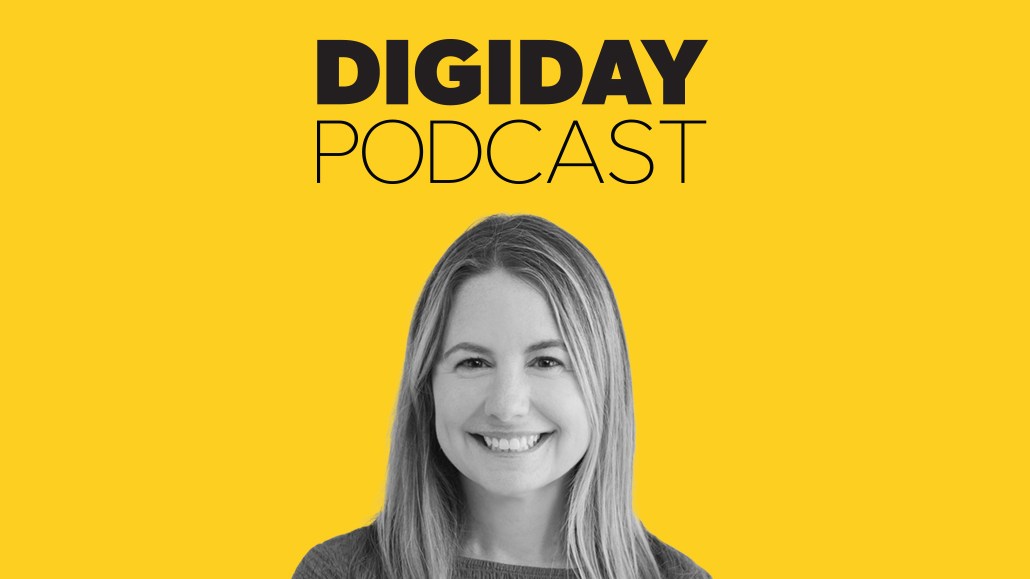Secure your place at the Digiday Publishing Summit in Vail, March 23-25
How Nuuly plans to retain customer subscriptions, data after its first growth spurt

Subscribe: Apple Podcasts • Spotify
In the era of so-called subscription fatigue, subscription clothing rental service Nuuly has managed to not only increase its number of subscribers, but also turn a profit while its competitors are scrambling for profitability. (A close look at Nuuly’s profitability here.)
Nuuly, which is owned by Urban Outfitters, hit its first growth spurt in Q3 of last year. Nuuly’s net sales came in about $65.5 million last October, up from $35.2 million in that same quarter the year prior, marking a nearly 86% increase, according to the company’s earnings report. The clothing rental company also amassed nearly 200,000 subscribers as of last December, according to a spokesperson.
On this episode of the Digiday Podcast, we caught up with Kim Gallagher, executive director of marketing at Nuuly to talk about the company’s growth plans through 2024 and beyond.
“This is not the sexy answer, but we feel like we are in this unique spot of we’ve had a lot of growth, we’ve just achieved our first profitable quarter and we still feel like we have a lot of work to do to make our service as good as it can possibly be,” Gallagher said on a recent episode of the Digiday Podcast. “It’s been a couple of years of chasing growth, and we’re like, ‘Yeah, you know what? Let’s just focus on the core for a minute.”
Below are highlights from the conversation, which have been lightly edited and condensed for clarity.
Building out a strategy from word of mouth
Press has always been a great avenue for Nuuly since we launched. We leaned pretty heavily into getting the word out via the press and they’ve been great partners for us. And we’re continuing to try to figure out how to strengthen those relationships, make sure we always have new stories to tell. Word of mouth, just from day one, has been really how we’ve grown. So up to around 75% of customers tell us they’ve heard about Nuuly from friends or family. That might seem like, “Oh, that’s just organic, and that just happens.” But to be honest, a big goal of ours is figuring out what is the strategy that we have around word of mouth. It takes work to keep your name in people’s mouths and to keep that buzz going. So that’s really a goal for the whole team, to make sure that within each of their channels, they’re figuring out ways to continue to drive that word of mouth.
Season of growth in Q3
Profitability could only come because we got to a certain scale. So if you think about what a rental business entails, there are a lot of infrastructure costs. So there’s the cost of building up this whole fulfillment center that includes a pretty extensive laundry plant inside. There’s a lot of fixed costs there. There’s also a lot of costs just in our merchandise. We need to have enough inventory, not only available for us at the size we are right now, but to meet our growth goals. And in order to get to profitability, we needed to overcome some of the fixed cost hurdles that we had. So marketing played a big role in getting new customers in the door, but also keeping our existing customers retained, or in some cases bringing them back if they decided to cancel. I will say that the retention side feels much more like a group effort across teams. So it’s marketing, but it’s in partnership with the digital product team who’s working to make new features and new ways for customers to engage. That partnership is a lot of the reason why we’ve been able to retain our customers for a long time.
Data in the data deprecation era
Our own first-party data is really strong at Nuuly. But not just at Nuuly. We are part of a bigger parent company. We’re part of Urban Outfitters Inc. All of our data flows into a shared [customer relationship management] database. So we have more access in that regard to customer data and certainly to data of the type of customer that Nuuly is interested in targeting. Not to say they that we’re frequently using that data to target customers. To be honest, a company like Meta is going to do a better job at targeting customers than any feed of customers I could ever upload, and a lot of people have learned that along the way, so I’m not super concerned about the loss of the cookies right now.
More in Podcasts

‘An ethics issue’: Why some creators are re-auditing their brand deals after Hootsuite-ICE controversy
Hootsuite’s partnership with ICE sparked controversy earlier this year, prompting creators to re-examine their brand deals and ethics standards.

ChatGPT enters the ad game. Now what?
OpenAI has begun testing ads in ChatGPT through premium brand partnerships, signaling a new phase in its monetization strategy.

Digiday ranks the best and worst Super Bowl 2026 ads
Now that the dust has settled, it’s time to reflect on the best and worst commercials from Super Bowl 2026.








